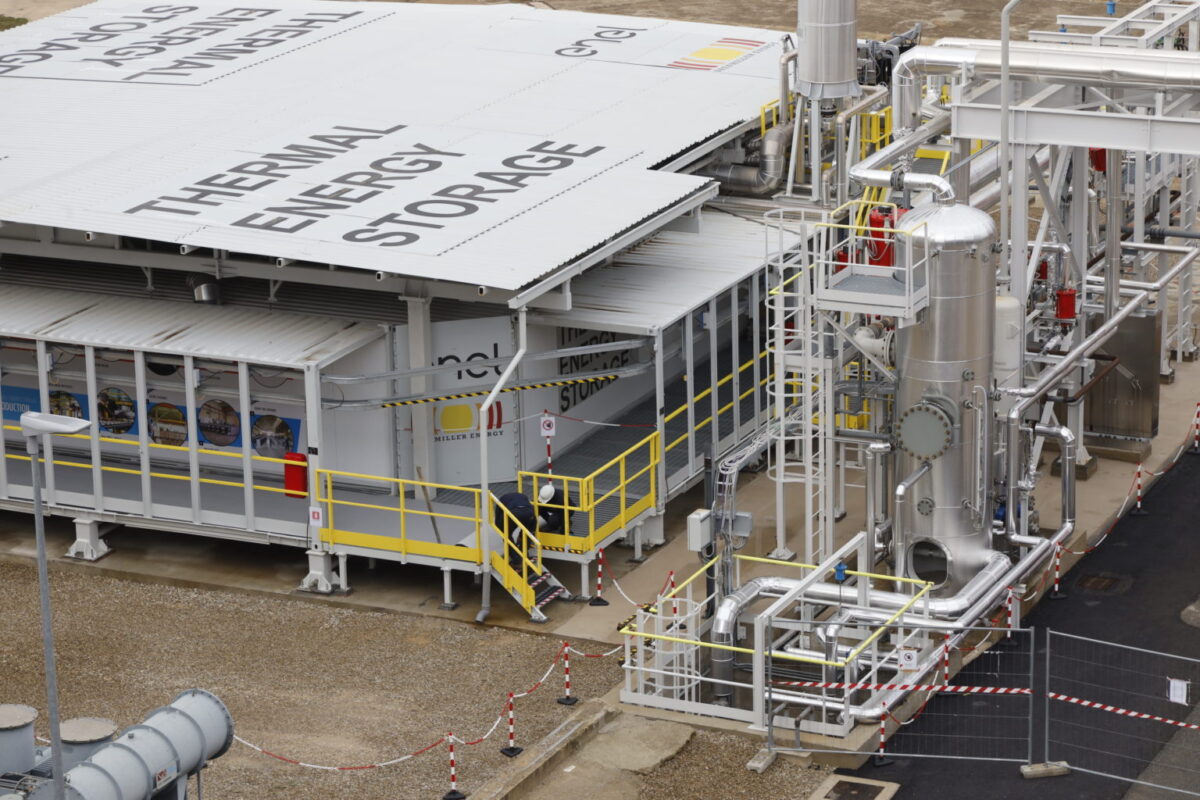From pv magazine Global
Thermal energy storage (TES) has shown great potential to contribute to the decarbonization of global heat and power. But while the technology has attracted funding and early commercialized installations, it has largely failed to scale well.
Israel-based Brenmiller is looking set to become one of the first companies in this field to establish a full gigawatt-scale production by the year’s end. “Our 4 GW to 5 GW automated production line in Diona will be switched on in one to two months from now,” Brenmiller’s CBO Doron Brenmiller tells pv magazine.
The equipment purchase was financed through a non-dilutive EUR 7.5 million ($8.2 million) credit facility with the European Investment Bank (EIB).
Brenmiller’s bGen system heat crushes rocks and then stores that thermal energy for minutes, hours, or days. The stored heat energy can be used to produce energy in the form of steam for electricity, water, or hot air for industrial applications. The bGen system is said to be low maintenance, with a lifespan of more than 30 years.
“Our levelized cost of heat (LCOH) depends on what is charging the system. Typically, this is cheap renewable energy, so our LCOH stands between 30-50 $/MWh, which makes it cheaper than gas today in most places in Europe,” Brenmiller says.
According to him, the company has managed to find immediate partners in the chemicals, pharmaceutical, food and beverage, and tabacco industries which consume massive amounts of heat that typically represents 60-70% of their energy consumption. “Cement and steel industries are a bit more challenging for us, as we operate in the 150 – 500 degrees C range, and these industries need higher temperatures for their industrial processes,” he adds.
The company has also partnered with large energy companies and IPPs such as Enel. In November last year, the Italian energy group started testing a 24 MWh TES system in Tuscany both as power-to-heat equipment and a thermal storage. In this first-of-a-kind application, the TES is integrated with a combined cycle gas turbine power plant to increase its overall flexibility.
“In the last couple of years, we have seen a huge uptick in demand for our technology and we already have a gigawatt-scale pipeline of projects. But it took us a long time to get there, we have invested more than half a million of dollars over the last 10 years,” Brenmiller say.
Due to the high shipment costs for its technology, the company’s strategy is to produce locally – either close to raw materials or project locations. “We are already in discussions in different markets in Europe, specifically Spain, Germany, the Netherlands and Denmark, but also in Brazil, to establish manufacturing facilities there,” he says.
“Today, it’s not all about lithium-based storage technologies. We see a lot of tenders starting go out for TES solutions and companies are proactively approaching us. There is a significant change in the market compared to two-three years ago,” Brenmiller says.
According to a report from the Long-Duration Energy Storage Council and McKinsey & Co. released in November last year, TES can expand the overall installed capacity potential of long-duration energy storage (LDES) to between 2 and 8 TW by 2040 (versus 1 to 3 TW without TES), which translates to a cumulative investment of $1.6 trillion to $2.5 trillion.
“TES enables this additional LDES opportunity by providing a cost-efficient alternative to decarbonizing heat and high-temperature heating applications. This is estimated to reduce system costs by up to $540 billion per year while creating broader system value by enabling an accelerated renewables build-out and optimization of grid utilization,” the report reads.
This content is protected by copyright and may not be reused. If you want to cooperate with us and would like to reuse some of our content, please contact: editors@pv-magazine.com.









This is limited to using heat in which case it can be very good. But making power from it will likely lose 60% of the input power.
I’d be looking to charge it with concentrated solar which is much more, 4x as efficient than turning electricity into heat.
Many industrial processes from making cement, refining metals, making battery materials, recycling many materials become very profitable with high temp clean solar heat.
And one can generate on demand power from the cooling product or use the waste heat.